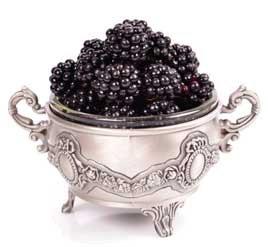





1. Blackberry Facts
2. Types of Blackberries
3. Nutritional Value of Blackberries
4. Health Benefits of Blackberries
The blackberry is an edible fruit ("berry") produced by many species in the genus Rubus in the family Rosaceae, hybrids among these species within the subgenus Rubus, and hybrids between the subgenera Rubus and Idaeobatus. The taxonomy of blackberries has historically been confused because of hybridization and apomixis so that species have often been grouped together and called species aggregates.
Rubus armeniacus (Himalayan or Armenian blackberry) is considered a noxious weed and invasive species in many regions of the Pacific Northwest of Canada and the United States, where it grows out of control in urban and suburban parks and woodlands.
History and Origin
Blackberries originated in temperate regions of the Northern Hemisphere and have been part of human diets since at least the Iron Age, around 500 BC. Their history is marked by use as a food source, medicine, and dye, with ancient civilizations like the Greeks and Romans using them for various ailments. They spread to other parts of the world through trade and colonization, becoming a significant source of food and an important part of agriculture and gardening in places like Europe and the Americas.
- • Chester
- • Cascade Thornless
- • Karaka
- • Loch Ness
- • Loganberry
- • Ouachita
- • Waldo
Commonly grown and sold blackberries in Australia include commercial varieties like 'Chester' and 'Loch Ness', which are thornless and productive. Other varieties available from nurseries and growers are 'Waldo' and 'Karaka', along with hybrid berries like 'Loganberry'. While many native wild blackberry species are considered weeds, nurseries focus on cultivating these specific, less-invasive varieties for home growers.
Commercial and nursery varieties
Chester: A popular thornless, heavy-cropping variety that produces large, sweet fruit late in the season. It is known for its vigorous growth.
Loch Ness: A main-season blackberry available commercially and from nurseries.
Waldo: A popular thornless variety that is a good producer.
Karaka: A variety available from nurseries.
Other types and related berries
Cascade Thornless: An heirloom variety with large berries that has a flavour similar to a tayberry or marionberry.
Loganberry: A hybrid of a raspberry and a North American blackberry, known for its balanced sweetness and tartness.
Ouachita: A thornless variety that has shown resilience in both cold and hot climates and produces sweet berries.
Invasive species
While certain commercial varieties are bred for cultivation, many native and European blackberry species are considered highly invasive weeds in Australia, such as those in the Rubus fruticosus species aggregate.
These weeds are a declared plant in some states and landowners have a legal responsibility to control them.
Fruit ” Blackberry ” ( Nutritional value )
Nutritional value per 100 g
Blackberries, raw
|
Nutrient ( Proximate’s )
|
Unit
|
Value
|
Daily Value %
|
|
Energy
|
kcal
|
43
|
2.1%
|
|
Protein
|
g
|
1.39
|
2.7%
|
|
Total lipid (fat)
|
g
|
0.49
|
0.6%
|
|
Carbohydrate, by difference
|
g
|
9.61
|
3.5%
|
|
Fiber, total dietary
|
g
|
5.3
|
18.9%
|
|
Sugars, total
|
g
|
4.88
|
|
|
Minerals
|
|||
|
Calcium, Ca
|
mg
|
29
|
2.2%
|
|
Iron, Fe
|
mg
|
0.62
|
3.4%
|
|
Magnesium, Mg
|
mg
|
20
|
4.7%
|
|
Phosphorus, P
|
mg
|
22
|
1.7%
|
|
Potassium, K
|
mg
|
162
|
3.4%
|
|
Sodium, Na
|
mg
|
1
|
0.04%
|
|
Zinc, Zn
|
mg
|
0.53
|
4.8%
|
|
Copper, Cu
|
mg
|
0.165
|
18.3%
|
|
Manganese, Mn
|
mg
|
0.646
|
28.0%
|
|
Selenium, Se
|
mcg
|
0.646
|
1.1%
|
|
Vitamins
|
|||
|
Vitamin C, total ascorbic acid
|
mg
|
21.0
|
23.3%
|
|
Thiamin (B-1)
|
mg
|
0.020
|
1.6%
|
|
Riboflavin (B-2)
|
mg
|
0.026
|
1.9%
|
|
Niacin (B-3)
|
mg
|
0.646
|
4.0%
|
|
Pantothenic acid (B-5)
|
mg
|
0.276
|
5.5%
|
|
Vitamin B-6
|
mg
|
0.030
|
1.7%
|
|
Vitamin B-12
|
mg
|
0.00
|
|
|
Folate DFE (dietary folate) (B-9)
|
mcg |
25
|
6.2%
|
|
Vitamin A, RAE (retinol)
|
mcg
|
11
|
1.2%
|
|
Vitamin E (alpha-tocopherol)
|
mg
|
1.17
|
7.8%
|
|
Vitamin D
|
mcg |
0
|
|
|
Vitamin K (phylloquinone)
|
mcg
|
19.8
|
16.5%
|
|
Lipids
|
|||
|
Saturated Fatty Acids
|
g
|
0.014
|
0.07%
|
|
Monounsaturated Fatty Acids
|
g
|
0.047
|
|
|
Polyunsaturated Fatty Acids
|
g
|
0.280
|
|
|
Trans Fatty Acids
|
g
|
0.000
|
|
|
Carotenoids
|
|||
|
Beta-Carotene
|
mcg
|
128
|
|
|
Lutein + zeaxanthin
|
mcg
|
118
|
|

|
Reference Values are based on a 2,000 Calorie Intake, for Adults and Children 4 or More Years of Age. Your daily values may be higher or lower depending on your calorie needs.
|
|
Percentages are roughly approximated using (RDA) Recommended Dietary Allowances for adults. Source: Nutrient Database – USDA (United States Department of Agriculture)
|
|
Reference Values for Nutrition – FDA U.S. Food and Drug Administration
|
Blackberry Nutritional Value
Blackberries provide numerous health benefits due to their rich content of vitamins, fiber, and antioxidants. They support heart health by lowering cholesterol and blood pressure, boost the immune system with vitamin C, and promote digestive health with high fiber content. Additionally, they may help protect against chronic diseases, improve brain function, support bone health, and aid in wound healing. They can help protect against chronic diseases like cancer and heart disease by fighting free radical damage, and their anti-inflammatory properties can also aid overall well-being.
- CANCER PREVENTION
Blackberries are packed with vitamins, minerals, fiber and antioxidants. “These nutrients are essential for good health,” says Zumpano. “And research studies show that antioxidants may reduce inflammation and prevent many diseases, including cancer. - BRAIN FUNCTION
Blackberries support brain function through several key mechanisms: the antioxidant anthocyanins increase blood flow to the brain and improve memory and attention. They also provide manganese, which is vital for neurotransmission and brain health, and other antioxidants that protect neurons from damage. Regularly eating blackberries may help prevent age-related cognitive decline and conditions like dementia. - REDUCED INFLAMMATION
Blackberries reduce inflammation due to their high content of antioxidants, such as anthocyanins and ellagic acid, which combat oxidative stress and inhibit inflammatory pathways. This is because these compounds help neutralize free radicals and reduce the production of inflammatory markers, which can contribute to the development of chronic diseases like heart disease and diabetes. - DIABETES MANAGEMENT
Blackberries can be beneficial for diabetes management due to their low glycaemic index and high fiber content, which help prevent blood sugar spikes. They are rich in antioxidants and other nutrients that may improve insulin sensitivity and support overall metabolic health. To maximize benefits, eat them in moderation, pair them with protein or healthy fats, and choose whole berries over processed juice.

- HEART HEALTH
Blackberries support heart health by providing antioxidants, fiber, and other nutrients that can lower inflammation, reduce "bad" LDL cholesterol, and increase "good" HDL cholesterol. The high levels of antioxidants, such as anthocyanins, help protect against cardiovascular disease, while their fiber content and potassium contribute to lower blood pressure. - ORAL HEALTH
Blackberries have benefits for oral health due to their antibacterial and anti-inflammatory properties, which may help fight gum disease by reducing the activity of bacteria like Porphyromonas gingivitis and Fusobacterium nucleatum. However, they can also stain teeth due to their rich pigments, so it is best to rinse your mouth or brush your teeth afterward to minimize this risk. - IMMUNE SUPPORT
Blackberries support the immune system by providing high levels of Vitamin C, which helps produce white blood cells and acts as an antioxidant. They also contain beneficial compounds like anthocyanins and flavonoids, which have antimicrobial properties and can fight inflammation. Additionally, their high fiber content supports a healthy gut microbiome, which is linked to a strong immune response. - PROTECT AGAINST CHRONIC DISEASES
Blackberries can help protect against chronic diseases due to their rich content of antioxidants, vitamins, minerals, and fiber. These compounds, particularly anthocyanins, help combat oxidative stress and reduce inflammation, which are linked to diseases like heart disease, type 2 diabetes, and some cancers.
References
Nutrient Database – USDA (United States Department of Agriculture)
Reference Values for Nutrition – FDA U.S. Food and Drug Administration
Heart health - Blackberries support heart health by providing antioxidants, fiber, and other nutrients that can lower inflammation, reduce "bad" LDL cholesterol, and increase "good" HDL cholesterol. The high levels of antioxidants, such as anthocyanins, help protect against cardiovascular disease, while their fiber content and potassium contribute to lower blood pressure.
Brain function - Blackberries support brain function through several key mechanisms: the antioxidant anthocyanins increase blood flow to the brain and improve memory and attention. They also provide manganese, which is vital for neurotransmission and brain health, and other antioxidants that protect neurons from damage. Regularly eating blackberries may help prevent age-related cognitive decline and conditions like dementia.
Reduced inflammation - Blackberries reduce inflammation due to their high content of antioxidants, such as anthocyanins and ellagic acid, which combat oxidative stress and inhibit inflammatory pathways. This is because these compounds help neutralize free radicals and reduce the production of inflammatory markers, which can contribute to the development of chronic diseases like heart disease and diabetes.
Diabetes management - Blackberries can be beneficial for diabetes management due to their low glycaemic index and high fiber content, which help prevent blood sugar spikes. They are rich in antioxidants and other nutrients that may improve insulin sensitivity and support overall metabolic health. To maximize benefits, eat them in moderation, pair them with protein or healthy fats, and choose whole berries over processed juice.
Cancer prevention - Blackberries are packed with vitamins, minerals, fiber and antioxidants. “These nutrients are essential for good health,” says Zumpano. “And research studies show that antioxidants may reduce inflammation and prevent many diseases, including cancer.
Oral health - Blackberries have benefits for oral health due to their antibacterial and anti-inflammatory properties, which may help fight gum disease by reducing the activity of bacteria like Porphyromonas gingivitis and Fusobacterium nucleatum. However, they can also stain teeth due to their rich pigments, so it is best to rinse your mouth or brush your teeth afterward to minimize this risk.
Immune support - Blackberries support the immune system by providing high levels of Vitamin C, which helps produce white blood cells and acts as an antioxidant. They also contain beneficial compounds like anthocyanins and flavonoids, which have antimicrobial properties and can fight inflammation. Additionally, their high fiber content supports a healthy gut microbiome, which is linked to a strong immune response.
Protect against chronic diseases - Blackberries can help protect against chronic diseases due to their rich content of antioxidants, vitamins, minerals, and fiber. These compounds, particularly anthocyanins, help combat oxidative stress and reduce inflammation, which are linked to diseases like heart disease, type 2 diabetes, and some cancers.
